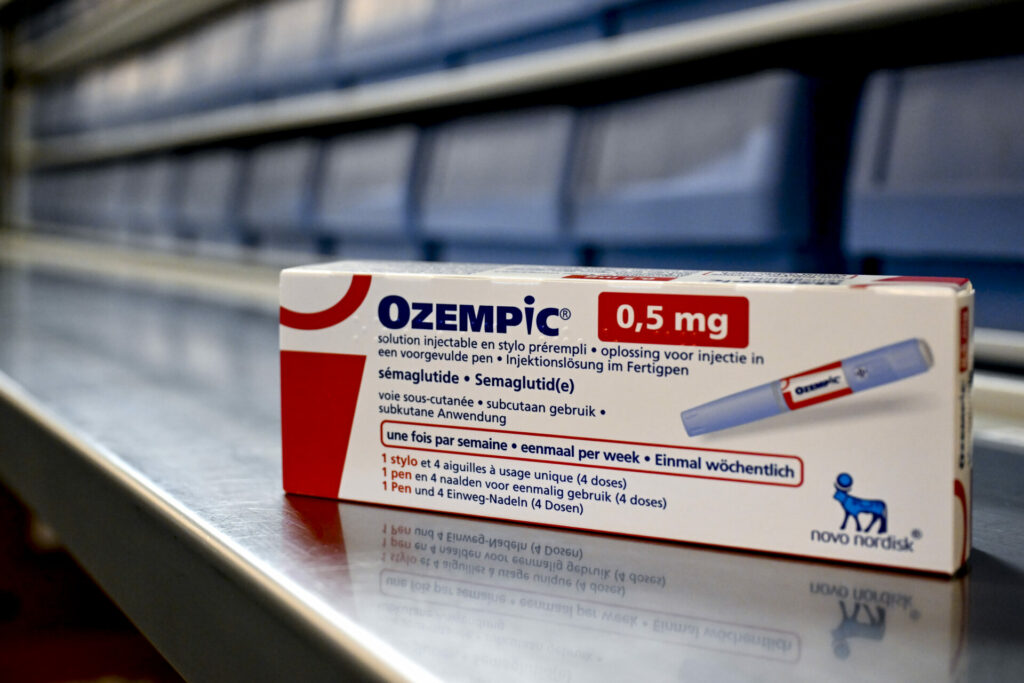Mounjaro, a new drug against type 2 diabetes and obesity, is available in Belgium from Friday. The drug is similar to the popular Ozempic, but is said to work even better.
Following France, Germany and the Netherlands, the new diabetes and weight-loss drug from US pharma company Eli Lilly is now also entering the Belgian market. Mounjaro will be available on prescription for people with type 2 diabetes with irregular blood sugar levels, as well as for some people with obesity.
"The innovative medicine combines the actions of two important hormones in the body, GLP-1 and GIP. The active ingredient is called Tirzepatide," said the Belgian Diabetes League. "This unique approach helps to lower blood sugar levels, reduce appetite and stabilise body weight, making it a powerful choice for people with type 2 diabetes."
Mounjaro is intended for adults with type 2 diabetes and/or for people with a Body Mass Index (BMI) of 30 or more. People with a BMI between 27 and 30 are also eligible if they have at least one underlying condition that is linked to being overweight, such as cardiovascular disease, pre-diabetes and sleep apnoea.
The manufacturer specified that the drug should not be used during pregnancy or when trying to become pregnant.
How does it work?
Mounjaro works similarly to Ozempic and other new weight-loss drugs: it mimics the action of hormones that occur naturally in a person's gut and inhibit their appetite. For Mounjaro, however, the active ingredient Tirzepatide mimics not one gut hormone but two.
"As a result, Mounjaro works better than Ozempic," endocrinologist Chantal Mathieu (UZ Leuven) told VRT. "It works so well, in fact, that it even completely normalises the blood sugar levels of some diabetes patients. As long as they keep injecting the drug, of course. It doesn't cure the condition, but it is a very promising medicine."
Mounjaro must be injected once a week using an injection pen. As soon as people stop taking the medicine, its effect also stops – meaning it is very important that people adjust their lifestyle at the same time. "When you lose weight, you actually lose about the same amount of muscle as fat. But if you gain weight again afterwards, that is only fat. So it is important to always seek proper guidance from a dietician or doctor."

Diabetes drug Ozempic. Credit: Belga / Dirk Waem
Mathieu added that the drug promises better results than Ozempic, with weight loss of up to 20% and possibly more.
Importantly, Mounjaro's impressive results are the product of clinical studies with higher doses than those now coming on the market in Belgium. With the dose that is currently on the Belgian market, Mounjaro offers similar results to Ozempic.
For Ozempic, there are now restrictions in Belgium as it became so popular for weight loss that production could not keep up. This resulted in a shortage of the drug. As this meant people with diabetes could no longer get the medicine they needed, they have now been given priority. For new patients, Ozempic can now only be prescribed by an endocrinologist. Next in line are people with severe obesity (a BMI of 35 or more).
Similar restrictions do not apply to Mounjaro for the time being. "The evaluation is still ongoing," reported the Federal Agency for Medicines and Health Products (FAMHP).
The most common side effects for Mounjaro are mild to moderate gastrointestinal symptoms such as nausea, diarrhoea and constipation. Serious side effects appear to be rare so far, the Diabetes League said.
How much does it cost?
An injection pen with four doses of Mounjaro – enough for a month – costs €232.80. For now, the drug will not be reimbursed in Belgium but a reimbursement procedure for patients with type 2 diabetes is ongoing. This is not the case for people with obesity.
"Mounjaro is obviously not cheap, so we advocate that the drug be partially, or preferably fully, reimbursed as soon as possible," said the Diabetes League.
The higher doses tested in the clinical trials may not come onto the market in Belgium until 2025. These are expected to be much more expensive.
Diabetes: Causes, Types, and Treatments
Diabetes is a chronic condition caused by an insufficient production or response to insulin, a hormone which regulates blood glucose. Irregular blood sugars can lead to significant health issues including damage to vital organs and nerves.
There are three distinct types of diabetes: Type 1 diabetes results from the destruction of insulin-producing cells by a person's autoimmune system. Type 2 is due to an ineffective use or production of insulin, and is often associated with a person’s diet. Gestational diabetes refers to when a pregnant person develops the condition.
The conditions can be managed through medications or insulin injections, as well as regular monitoring of blood sugar levels.
Treatment for high blood sugar involves injecting insulin or changes in medications or lifestyle changes.
In case of low blood sugar, diabetics are recommended to ingest fast-acting carbohydrates, like glucose tablets or juice. In severe cases a glucagon injection or nasal powder can be used.

